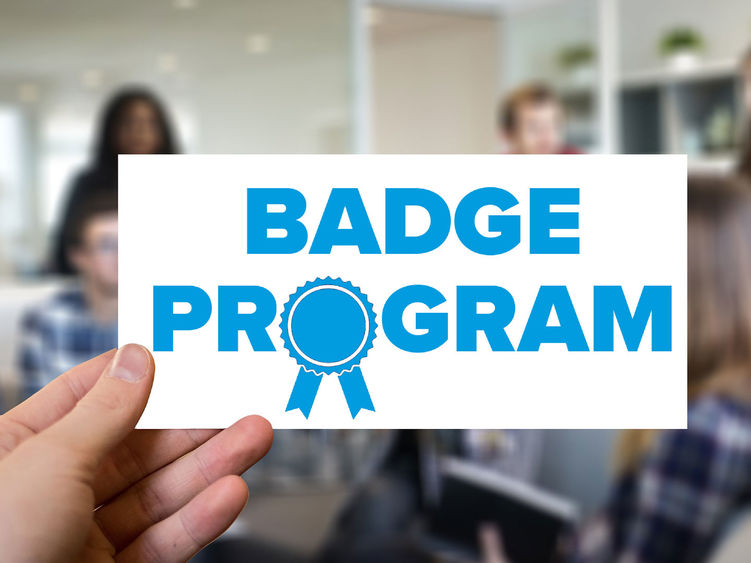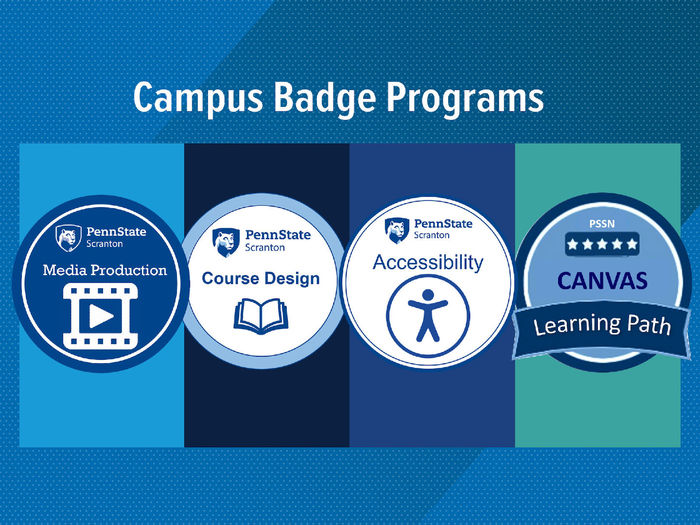
Over the past eight years, Penn State Scranton has offered a variety of "badge" programs each semester through its information technology department that allow faculty and staff to enhance their professional and technical skills, as well as classroom learning development, benefiting faculty taking the programs and the students they teach, as well as the campus' administrative office operations.
DUNMORE, Pa. — For the last eight years, Griffith Lewis, Penn State Scranton's instructional designer, has worked closely with faculty and staff to enhance their skills and classroom learning development through various badge programs offered each semester.
“I believe the badges to be important, as they are for faculty and staff professional development,” Lewis said. “Ultimately, faculty earning our badges should be creating better courses for our students.”
The campus badge programs began in spring 2016 with the Canvas Learning Path Badge created for the University’s transition to a new learning management system. The Penn State Scranton Web Content Stewards Badge provided training on updating the campus website, writing effective content, and providing the clearest information to current and prospective students and their families. This badge also provided web stewards with technical, design, content and marketing training.
Since then, the campus’ badge programs have grown to help staff and faculty meet their own individual and professional goals.
“After earning the Canvas and Course Design badges, the application of Penn State’s best practices should improve the usability of their Canvas sections as well as their individual course components,” Lewis said. “The Media Badge will help faculty create their own instructional materials to say exactly what they want their students to know, and the Accessibility Badge will ensure that all students can access instructional materials.”
The new Accessibility Badge program starts Thursday, Sept. 14, and participants will learn Penn State accessibility requirements and create a Canvas course utilizing Universal Design for Learning principles.
There are currently four different badge programs tailored for faculty and staff to learn new skills.
Media Production Badge
The Media Production Badge is a newly offered course, where participants are able to create a piece of instructional or promotional media, starting with their learning objective or story idea and proceeding through production to a final presentation to their audience. Badge earners will develop their objective/idea into their choice of media, either a video, podcast, website or multimedia presentation, by following the production steps of their choice. The campus Media Badge is in three sessions and includes a fourth session for sharing completed participant media productions.
Multimedia Specialist Shannon Williams was one of the first badge earners for the new Media Production Badge program, and said she enjoyed getting to learn the process of video editing.
“I wanted to add another skill set to my multimedia specialist’s toolbox. I haven’t had much video editing experience and knew that it was important for me to learn that,” Williams said.
For her project, Williams created a holiday video that celebrates the diversity of the campus and the unique traditions students, faculty and staff celebrate during the holiday season.
“It was nice working with Emily Glodzik, coordinator of diversity, equity, and inclusion, to plan it out, and working with some of our faculty, staff and students and learning about their holiday traditions,” Williams said. “Shooting the video in the One Button Studio was fun and easy to do. Not only did I learn to shoot and edit the video, but I learned how important it is to direct the people appearing in the video so that you get the results you want. I’m looking forward to creating more videos in the future.”
Beatriz Rivera-Barnes, associate professor of Spanish, is in the process of completing the Media Production Badge and is focusing on creating a video segment about the history and evolution of bananas in Latin America and their arrival to the United States to teach her classes about Spanish civilization.
“Bananas are important to our history, as they weren’t always around. They are a staple that we often take for granted,” Rivera-Barnes said.
While she never created a storyboard or script before, Rivera-Barnes said that this badge has brought out a new side of creativeness compared to when she’s teaching students or writing novels and also enjoys the mentorship she receives from Lewis.
“So far, the Media Badge has been a great experience. Griff is very patient and knowledgeable, leads you step by step, and his guidance enhances my creativity,” she said.
Course Design Badge
Within the Course Design Badge, participants develop a course from beginning to end, starting with learner analysis, creation of course goals and objectives, and the selection and utilization of instructional materials. Badge earners will provide a summative assessment of their course based on student feedback and revise as necessary. The Course Design Badge is in four sessions and includes consulting with the campus instructional designer for creating a new course or revising an existing course.
Recent Course Design Badge earners Francesca Amato, adjunct lecturer of Italian, arts and humanities, and Angela Bassani, assistant teaching professor of accounting, both expressed how much they enjoyed having the experience to learn from Lewis.
Completing the Course Design Badge with Lewis was a “wonderful experience” said Bassani. “I was able to walk away with many great ideas to add to my ‘toolbox’ that I can implement throughout both my traditional classroom-based courses and web offerings. We have so many wonderful resources here at Penn State to help us help our students succeed to the point where it can actually be a little overwhelming learning about them all on our own. The possibilities are truly endless.”
Learning from Lewis also enhanced the learning experience and badge program for Bassani.
“Griff is a wealth of knowledge, and we are lucky to have him to bounce ideas off of. It was also such a great opportunity to collaborate with my colleagues who were also completing the course design badge at the same time,” Bassani said.
Amato had a similar experience.
“I enjoyed the course, as it was very clear and easy to understand, and Griff made a big difference too,” Amato said. “It is not only a course; it is much more than that. I was not only listening to simple slides, but I was able to do my questions, being active in the process of designing my course, and was able to learn new things.”
Amato encourages others to take this badge program as it gave her the opportunity to create and design her own course.
Accessibility Badge
Participants in the Accessibility Badge program will learn Penn State accessibility requirements and create a Canvas course utilizing Universal Design for Learning principles. Badge earners will produce accessible course materials and media to provide for the inclusion of all students. The Accessibility Badge is in five sessions and includes consulting with the campus instructional designer for creating a new course or revising an existing course.
Paul Frisch, assistant teaching professor of history, said the Accessibility Badge is vital, especially with how widely technology is used today in the classroom.
"In recent years, there are two aspects of academia that are coming more to the forefront — accessibility and also online technology. Being able to then learn how to ensure that my courses are accessible, especially for my online courses, will provide a better learning experience for my students,” Frisch said, adding “what is even better is to work with Griff, who is an amazing instructional designer, and be able to bounce questions off of him to get the most out of the workshop. Because technology is being utilized even more within the classroom not just for online instruction, a badge like this is key to ensure that all students have the best experience possible and not fall behind because something is not formatted correctly for them to read and follow along."
Canvas Learning Path Badge
Canvas Learning Badge participants demonstrate the creation of a Canvas course section for their students by following the Penn State Canvas Learning Path. The final Canvas course will include all elements required for students to easily utilize the course during a semester by following best practices from the University and Quality Matters. The Canvas Learning Path Badge is in five sessions and includes consulting with the campus instructional designer to review a completed course. There is an optional sixth presentation, Facilitate Collaborative Learning with Canvas Groups offered on request.
James Wilkerson, assistant teaching professor and program coordinator of business, and Meg Hatch, associate professor of biology, are two of the many faculty members that have completed the Canvas Learning Path Badge.
While Wilkerson has taught online and used multiple learning management systems for years prior to obtaining the badge, he chose to complete this program as a way to benefit his students.
“To the extent I learned a new trick or two about organizing and delivering asynchronous online classes, my online students had less trouble understanding course content and timing,” Wilkerson said. “Some Canvas features are critical to giving students timely feedback regardless of delivery mode, which is what I value most about the platform. I also like being able to augment course material with posted articles that students can access easily in Canvas without having to use tons of papers to do that — the sustainability advantage is important to me.”
Hatch was in the first group of learners to earn the Canvas Learning Path Badge with a goal in mind to be prepared from the transition from ANGEL to Canvas, which took place in 2015.
“I think the badge programs are a great idea to recognize those that have completed a certain level of training,” Hatch said, adding that she is eager to complete the Media Production Badge in the future.
The Accessibility Badge program starts on Thursday, Sept. 14, so there is still time for interested participants to enroll. Penn State Scranton employees can enroll in any campus badge program by clicking here.






